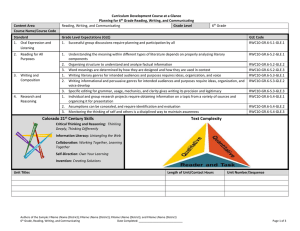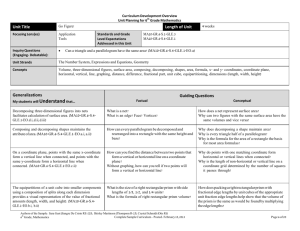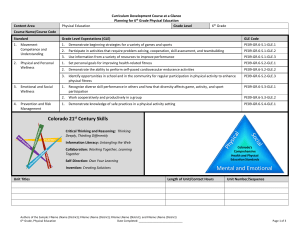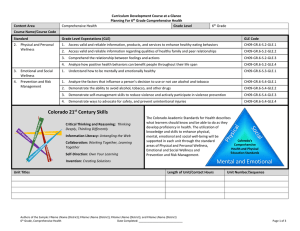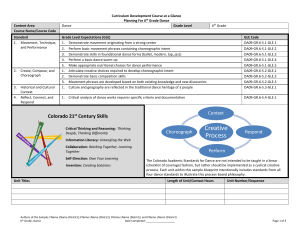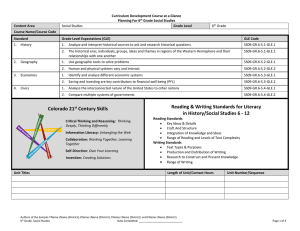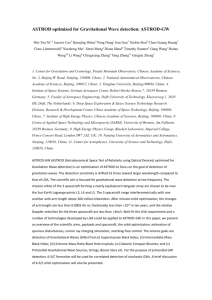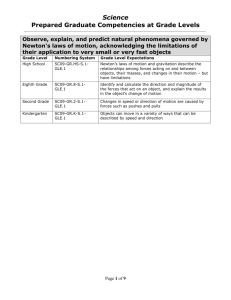Document 15590623
advertisement
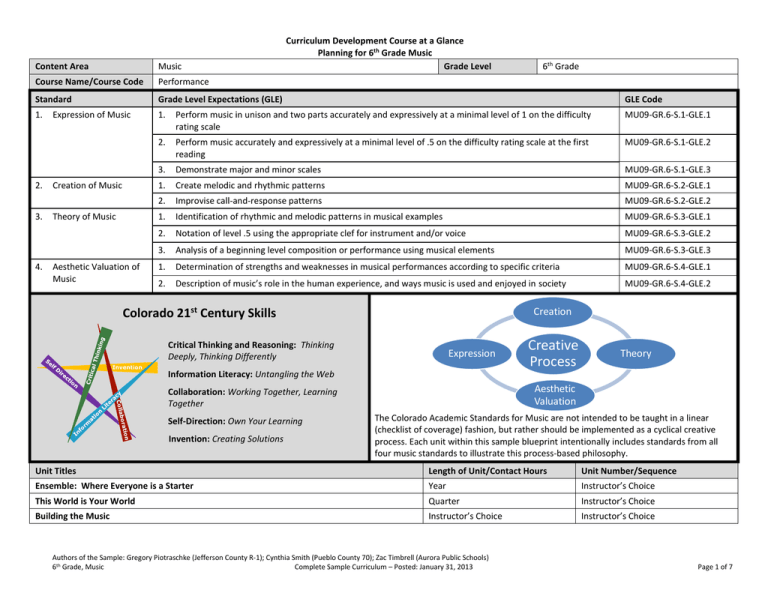
Curriculum Development Course at a Glance Planning for 6th Grade Music Grade Level 6th Grade Content Area Music Course Name/Course Code Performance Standard Grade Level Expectations (GLE) GLE Code 1. 1. Perform music in unison and two parts accurately and expressively at a minimal level of 1 on the difficulty rating scale MU09-GR.6-S.1-GLE.1 2. Perform music accurately and expressively at a minimal level of .5 on the difficulty rating scale at the first reading MU09-GR.6-S.1-GLE.2 3. Demonstrate major and minor scales MU09-GR.6-S.1-GLE.3 1. Create melodic and rhythmic patterns MU09-GR.6-S.2-GLE.1 2. Improvise call-and-response patterns MU09-GR.6-S.2-GLE.2 1. Identification of rhythmic and melodic patterns in musical examples MU09-GR.6-S.3-GLE.1 2. Notation of level .5 using the appropriate clef for instrument and/or voice MU09-GR.6-S.3-GLE.2 3. Analysis of a beginning level composition or performance using musical elements MU09-GR.6-S.3-GLE.3 1. Determination of strengths and weaknesses in musical performances according to specific criteria MU09-GR.6-S.4-GLE.1 2. Description of music’s role in the human experience, and ways music is used and enjoyed in society MU09-GR.6-S.4-GLE.2 2. 3. 4. Expression of Music Creation of Music Theory of Music Aesthetic Valuation of Music Colorado 21st Century Skills Creation Critical Thinking and Reasoning: Thinking Deeply, Thinking Differently Invention Expression Creative Process Theory Information Literacy: Untangling the Web Aesthetic Valuation Collaboration: Working Together, Learning Together Self-Direction: Own Your Learning Invention: Creating Solutions The Colorado Academic Standards for Music are not intended to be taught in a linear (checklist of coverage) fashion, but rather should be implemented as a cyclical creative process. Each unit within this sample blueprint intentionally includes standards from all four music standards to illustrate this process-based philosophy. Unit Titles Length of Unit/Contact Hours Unit Number/Sequence Ensemble: Where Everyone is a Starter Year Instructor’s Choice This World is Your World Quarter Instructor’s Choice Building the Music Instructor’s Choice Instructor’s Choice Authors of the Sample: Gregory Piotraschke (Jefferson County R-1); Cynthia Smith (Pueblo County 70); Zac Timbrell (Aurora Public Schools) 6th Grade, Music Complete Sample Curriculum – Posted: January 31, 2013 Page 1 of 7 Curriculum Development Overview Unit Planning for 6th Grade Music Unit Title Ensemble: Where Everyone is a Starter Focusing Lens(es) System/Relationships Inquiry Questions (EngagingDebatable): Unit Strands Expression, Creation, Theory, Aesthetic Valuation Concepts Technique, Style, Expressions (articulation, dynamics), Energy, Structure and Function, System, Composition, Form Standards and Grade Level Expectations Addressed in this Unit Length of Unit Year MU09-GR.6-S.1-GLE.1, MU09-GR.6-S.1-GLE.2, MU09-GR.6-S.1-GLE.3 MU09-GR.6-S.2-GLE.1, MU09-GR.6-S.2-GLE.2, MU09-GR.6-S.2-GLE.3 MU09-GR.6-S.3-GLE.1, MU09-GR.6-S.3-GLE.2, MU09-GR.6-S.3-GLE.3 MU09-GR.6-S.4-GLE.1 Why is it important to watch the conductor, sing/play, and listen at the same time? (MU09-GR.6-S.1.-GLE.1,2) and (MU09-GR.6-S.2.-GLE 1,2,3) and (MU09-GR.6-S.3.-GLE.1,2,3)and (MU09-GR.6-S.4.GLE.1) Why is it important to perform with consistent tone quality, intonation, balance, blend, and phrasing? Why is it important to understand musical notation? Why is it important to sing/play scales? Generalizations My students will Understand that… Guiding Questions Factual Conceptual Good practice and rehearsal participation techniques optimize an ensemble’s success. (MU09-GR.6-S.1GLE.1,2,3) and (MU09-GR.6-S.3-GLE.1,2) What are the vital elements of good rehearsal participation? Why is it important to consistently play correct notes and rhythms? How does individual practice improve the overall quality of the ensemble? Why is it important that each part of an ensemble blends with the whole? The structure and function of music creates a system that every member can follow. (MU09-GR.6-S.1-GLE.1,2,3) and (MU09-GR.6-S.2-GLE.1,2) and (MU09-GR.6-S.3-GLE.1,2,3) and (MU09-GR.6-S.4-GLE.1) How does this ensemble count rhythms? How can the knowledge of major/minor scales enhance the ability to sight-read? Where does the “and” come from in counting rhythms? Technique and expression transfer to different styles of music (MU09-GR.6-S.2-GLE.1,2) and (MU09-GR.6-S.3GLE.1,3) and (MU09-GR.6-S.4-GLE.1-GLE.2) What techniques and expressions does your repertoire share? How can different styles have similarities? Why is important to have different styles of music? The expression of the ensemble is enhanced through the energy of its members (MU09-GR.6-S.1-GLE.1,2) and (MU09-GR.6-S.3-GLE.1) and (MU09-GR.6-S.4-GLE.2) How can you convey energy in a rehearsal? Why is energy important to music making? How can the audience affect the energy of a performance? Authors of the Sample: Gregory Piotraschke (Jefferson County R-1); Cynthia Smith (Pueblo County 70); Zac Timbrell (Aurora Public Schools) 6th Grade, Music Complete Sample Curriculum – Posted: January 31, 2013 Page 2 of 7 Curriculum Development Overview Unit Planning for 6th Grade Music Knowledge of musical structure and form allows for composition. (MU09-GR.6-S.2-GLE.1) and (MU09-GR.6S.3-GLE.2,3) and (MU09-GR.6-S.4-GLE.1) What are elements that make for a quality composition? How do missing elements affect the overall sound of a piece? Why is it important to have many symbols associated with music composition? Critical Content: Key Skills: My students will Know… My students will be able to (Do)… Suggested Repertoire: Simple Octavos for a Choir Setting, Methods Books or other similar starting materials for Band or Orchestra Proper practice and rehearsal behaviors (MU09-GR.6-S.1-GLE.1,2,3) and (MU09GR.6-S.3-GLE.1,2) The importance of energy in a rehearsal and performance setting (MU09-GR.6-S.1GLE.1,2) and (MU09-GR.6-S.3-GLE.1) and (MU09-GR.6-S.4-GLE.2) Technical vocabulary (listed below) (MU09-GR.6-S.1-GLE.1,2) and (MU09-GR.6-S.2GLE.1; MU09-GR.6-S.3-GLE.1,2,3) and (MU09-GR.6-S.4-GLE.1) Elements and techniques used in different styles of music (MU09-GR.6-S.1-GLE.1,2) and (MU09-GR.6-S.3-GLE.1,2,3) and (MU09-GR.6-S.4-GLE.1,2) A set of criteria for evaluating performance (MU09-GR.6-S.4-GLE.1) Read musical notation and demonstrate on their instrument/voice (MU09-GR.6S.1-GLE.1,2,3) and (MU09-GR.6-S.3-GLE.1,2) Demonstrate technical vocabulary through performance (MU09-GR.6-S.1-GLE.1,2) and (MU09-GR.6-S.3-GLE.1,2,3) Distinguish different styles of music through listening and performance (MU09GR.6-S.1-GLE.1,2) and (MU09-GR.6-S.3-GLE.1,2,3) and (MU09-GR.6-S.4-GLE.2-EO.c) Demonstrate proper practice and rehearsal behaviors (MU09-GR.6-S.1-GLE.1,2) Notate a simple melodic and rhythmic pattern (MU09-GR.6-S.2-GLE.1) Evaluate informal/formal performance (MU09-GR.6-S.4-GLE.1) Critical Language: includes the Academic and Technical vocabulary, semantics, and discourse which are particular to and necessary for accessing a given discipline. EXAMPLE: A student in Language Arts can demonstrate the ability to apply and comprehend critical language through the following statement: “Mark Twain exposes the hypocrisy of slavery through the use of satire.” A student in ______________ can demonstrate the ability to apply and comprehend critical language through the following statement(s): Understanding, knowing, and correctly demonstrating musical elements are necessary to be a contributing member of a performing ensemble. Academic Vocabulary: Rhythm, compose, style, technique, balance, blend, phrasing, ensemble Technical Vocabulary: Musical Elements - key signature, time signature, melody, harmony, major and minor scale, articulations (staccato, legato, accent), dynamics (pianissimo to fortissimo), tempo (largo to allegro tempos), intonation Authors of the Sample: Gregory Piotraschke (Jefferson County R-1); Cynthia Smith (Pueblo County 70); Zac Timbrell (Aurora Public Schools) 6th Grade, Music Complete Sample Curriculum – Posted: January 31, 2013 Page 3 of 7 Curriculum Development Overview Unit Planning for 6th Grade Music Unit Title Building the Music Focusing Lens(es) Intention, Choices Inquiry Questions (EngagingDebatable): Unit Strands Expression, Creation, Theory, Aesthetic Valuation Concepts Composition, Patterns, Technique, Rhythm, Style, Observation, Improvisation, Melody Length of Unit Standards and Grade Level Expectations Addressed in this Unit Instructor Choice MU09-GR.6-S.1-GLE.1, MU09-GR.6-S.1-GLE.2, MU09-GR.6-S.1-GLE.3 MU09-GR.6-S.2-GLE.1, MU09-GR.6-S.2-GLE.2 MU09-GR.6-S.3-GLE.1, MU09-GR.6-S.3-GLE.2, MU09-GR.6-S.3-GLE.3 MU09-GR.6-S.4-GLE.1, MU09-GR.6-S.4-GLE.2 How can you make music when there is no printed music in front of you? (MU09-GR.6-S.2-GLE.1,2) and (MU09-GR.6-S.3-GLE.1,3) and (MU09-GR.6-S.4GLE.1) How do compositional choices affect the final product? How could the process of composition and improvisation be described? Generalizations My students will Understand that… Guiding Questions Factual Conceptual Patterns observed in music inform composing and improvising. (MU09-GR.6-S.1-GLE.3) and (MU09-GR.6-S.2GLE.1,2) and (MU09-GR.6-S.3-GLE.2) What are some simple melodic patterns that can be used in improvisation? How is music built around patterns within major and minor scales? How might patterns influence a composition? Improvisation and composition employ foundational techniques in music. (MU09-GR.6-S.1-GLE.1,2,3) and (MU09-GR.6-S.2-GLE.2) and (MU09-GR.6-S.3-GLE.1,2,3) What are some foundational techniques of music? What elements of technique are critical to successful composition and improvisation? How do you decide which pitches to use when composing and improvising? Rhythm and melody communicate choice and style in improvisation and composition. (MU09-GR.6-S.2-GLE.1,2) and (MU09-GR.6-S.3-GLE.1,2,3) and (MU09-GR.6-S.4GLE.2) What are some simple rhythmic patterns that can be used in improvisation? How can rests be incorporated into composition and improvisation? How does listening to other musicians increase your ability to improvise? Authors of the Sample: Gregory Piotraschke (Jefferson County R-1); Cynthia Smith (Pueblo County 70); Zac Timbrell (Aurora Public Schools) 6th Grade, Music Complete Sample Curriculum – Posted: January 31, 2013 Page 4 of 7 Curriculum Development Overview Unit Planning for 6th Grade Music Critical Content: Key Skills: My students will Know… My students will be able to (Do)… Suggested Repertoire: “The complete history of Western Music arbrigged. By Audry Snyder (2 pt. choir); “Al Shlosha D’varim” Allan Naplan (2pt Choir) A La puerta Del cielo; Siyahamba; A La Nanita Nana; Pat-a-tan; Shalom Chavarim; African Noel; Danny Boy; Go tell aunt Rhode; “5 note concerto” by John O’Reilly (band);)” 3-Airs from Glouchester” by Hugh Stuart (band) Musical composition and improvisation encourages creativity (MU09-GR.6-S.2GLE.1,2) Composition and improvisation complements the whole musical experience (MU09-GR.6-S.2-GLE.1,2) and (MU09-GR.6-S.4-GLE.2) Choice is essential to the creative process (MU09-GR.6-S.2-GLE.1,2) Compose simple melodic and rhythmic patterns (MU09-GR.6-S.2-GLE.1) Improvise simple melodic and rhythmic patterns (MU09-GR.6-S.2-GLE.2) Demonstrate proper technique when composing and improvising (MU09-GR.6-S.1GLE.1,3) and (MU09-GR.6-S.2-GLE.1,2) and (MU09-GR.6-S.3-GLE.1,2,3) Defend their choices regarding composition and improvisation (MU09-GR.6-S.2GLE.1,2) and (MU09-GR.6-S.4-GLE.1) Critical Language: includes the Academic and Technical vocabulary, semantics, and discourse which are particular to and necessary for accessing a given discipline. EXAMPLE: A student in Language Arts can demonstrate the ability to apply and comprehend critical language through the following statement: “Mark Twain exposes the hypocrisy of slavery through the use of satire.” A student in ______________ can demonstrate the ability to apply and comprehend critical language through the following statement(s): Musical knowledge shapes the construction of composition and improvisation. Academic Vocabulary: Improvisation, composition, creativity, pattern, technique Technical Vocabulary: Melody, rhythm, chord structure, major and minor scales Authors of the Sample: Gregory Piotraschke (Jefferson County R-1); Cynthia Smith (Pueblo County 70); Zac Timbrell (Aurora Public Schools) 6th Grade, Music Complete Sample Curriculum – Posted: January 31, 2013 Page 5 of 7 Curriculum Development Overview Unit Planning for 6th Grade Music Unit Title Folk Songs & Their Place in Music Quarter Focusing Lens(es) Beliefs / Values, Origins Inquiry Questions (EngagingDebatable): Unit Strands Expression, Creation, Theory, Aesthetic Valuation Concepts Patterns, Rhythm, Influence, Culture, Tradition, Style, Music, Repertoire, Intention, Representation Length of Unit Standards and Grade Level Expectations Addressed in this Unit MU09-GR.6-S.1-GLE.1, MU09-GR.6-S.1-GLE.2, MU09-GR.6-S.1-GLE.3 MU09-GR.6-S.2-GLE.1, MU09-GR.6-S.2-GLE.2 MU09-GR.6-S.3-GLE.1, MU09-GR.6-S.3-GLE.2, MU09-GR.6-S.3-GLE.3 MU09-GR.6-S.4-GLE.1, MU09-GR.6-S.4-GLE.2 How does learning folk music increase one’s musical ability and awareness? (MU09-GR.6-S.1-GLE.1) and (MU09-GR.6-S.4-GLE.2) Why is it important to learn music from other cultures? What are ways that music is used in the traditions of society? What cultural music of today will future musicians consider “folk music”? Generalizations My students will Understand that… Guiding Questions Factual Conceptual Folk traditions provide understanding of the influence of culture on musical styles. (MU09-GR.6-S.1-GLE.1) and (MU09-GR.6-S.4-GLE.2) What cultures or folk traditions are represented in our current repertoire? How has folk repertoire influenced your country’s music? How can beliefs and values of a culture shape a composer’s intent? Folk music demonstrates patterns found in many styles of music. (MU09-GR.6-S.1-GLE.1,3) and (MU09-GR.6-S.3GLE.1,2,3) and (MU09-GR.6-S.4-GLE.1,2) What musical patterns are evident cross-culturally? What common chord patterns are found in folk music? How can different countries have similar styles of music? How does culture affect folk music? Folk music introduces different cultures to musicians of all levels. (MU09-GR.6-S.1-GLE.1,3) and (MU09-GR.6-S.3GLE.1,2,3) What rhythms are found throughout folk songs? How can folk music influence improvisation and composition? Why is it important to perform folk music? Authors of the Sample: Gregory Piotraschke (Jefferson County R-1); Cynthia Smith (Pueblo County 70); Zac Timbrell (Aurora Public Schools) 6th Grade, Music Complete Sample Curriculum – Posted: January 31, 2013 Page 6 of 7 Curriculum Development Overview Unit Planning for 6th Grade Music Critical Content: Key Skills: My students will Know… My students will be able to (Do)… Folk music influences culture and society (MU09-GR.6-S.4-GLE.2-EO) Musical technique is fundamental in performing folk music (MU09-GR.6-S.1GLE.1,2,3) and (MU09-GR.6-S.3-GLE.1,3) Performance and practice of folk music allows the individual to critique their own abilities (MU09-GR.6-S.1-GLE.1) and (MU09-GR.6-S.3-GLE.1,3) and (MU09-GR.6S.4-GLE.1) Perform folk music in unison and two parts. (MU09-GR.6-S.1-GLE.1) Identify rhythmic and melodic patterns in folk music. (MU09-GR.6-S.3-GLE.1) Analyze folk compositions and performance using musical terminology. (MU09GR.6-S.1-GLE.1) and (MU09-GR.6-S.3-GLE.3) Describe folk music’s role in society throughout history. (MU09-GR.6-S.4 –GLE.2) Create (in performance) and respond to a brief musical prompt in a folk style. (MU09-GR.6-S.1-GLE.1) and (MU09-GR.6-S.2-GLE.1,2) Critical Language: includes the Academic and Technical vocabulary, semantics, and discourse which are particular to and necessary for accessing a given discipline. EXAMPLE: A student in Language Arts can demonstrate the ability to apply and comprehend critical language through the following statement: “Mark Twain exposes the hypocrisy of slavery through the use of satire.” A student in ______________ can demonstrate the ability to apply and comprehend critical language through the following statement(s): Performing and interpreting the rhythmic and melodic patterns of folk music provide a glimpse into the practices and values of a society. Academic Vocabulary: Folk, composition, performance, analysis, culture, society, beliefs, values, origin, rehearsal Technical Vocabulary: Melodic patterns (scales), rhythmic patterns, musical interpretation, Expressions (articulation, dynamics) Authors of the Sample: Gregory Piotraschke (Jefferson County R-1); Cynthia Smith (Pueblo County 70); Zac Timbrell (Aurora Public Schools) 6th Grade, Music Complete Sample Curriculum – Posted: January 31, 2013 Page 7 of 7
